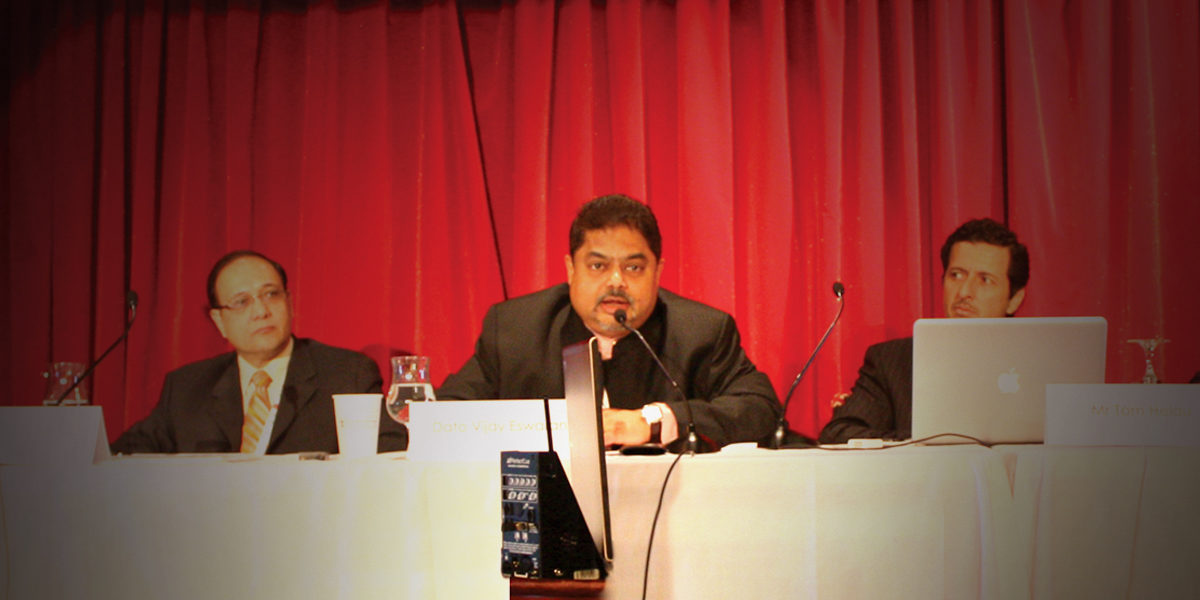The World Economic Forum’s East Asia Summit (EAS) was held in Jakarta, Indonesia this year on June 12-13. Vijay Eswaran was invited to be a panelist on a session titled – Vijay Eswaran was invited to speak at a session titled – Social Media in Asia : From Shaping norms to Influencing Policy.
Indonesia is already known for its high usage of Social Media channels, currently ranked No.2 in the world behind the United States of America in the usage of popular social networking platform Facebok. It has also emerged in the ComScore report from August 2010 as having the highest penetration of Twitter users in the world. Hence, a discussion on the influence and growth of Social Media was highly anticipated at the Forum and discussed in almost every session of the EAS.
John Riady, Editor-at-large, Jakarta Globe who set the tone for the discussion, moderated the panel discussion. “Social Media goes to the heart of the most profound revolution in the last 100 years. The digital revolution has empowered people, challenged boundaries, redefined the term friend; one now has to distinguish between Facebook friends and real life friends, sells products and makes or breaks governments”, he said.
The main conclusions of the session were that social media has become the driving force behind youth-based social movements in Asia and an essential communications platform for companies. As an active user of various social media platforms and as the leader of a company with a strong presence in key digital platforms, Vijay Eswaran pointed out that companies should no longer rely on traditional PR and crisis management techniques.
“We are currently in an age where people expect instant, real-time information, which makes social media the perfect solution. The reality is that social media is here to stay and companies have to learn to get involved or they’ll get left behind.” he said.
Another example of the might of social media in Asia was presented by Yoshito Hori, head of Globis University in Japan. “Twitter in Japan became the quickest way to find out what was happening following the earthquake and tsunami in March,” he said, adding that people were quick to post updates on who survived and who went missing in the aftermath of the massive disaster.”
But social media platforms are about more than just Facebook and Twitter, said Michelle Guthrie of Google Asia Pacific. “Social media is not restricted to those two sites,” she said, explaining that photo sharing sites were also some of the most popular platforms for Asian users.
The panelists also discussed the recent Arab uprising in the Middle East and the role played by social media in fueling the revolution. Vijay, who has written a column on the subject, explained why social media has become the face of the Arab revolution.
“To begin with, the word social in social media has proved disarming to the authorities who generally are control centric to the extent that one could refer to them as control freaks. Many of these countries have one point of entry for the Internet. And therefore they felt reasonably confident that they would be able to control content and distribution. What they failed to recognize has been a subset of growth within the social media sphere itself but with a variant change of technology, i.e, mobile phones, thus making cellphones whose statistical coverage and control are far more difficult if not impossible to ascertain. That has proven to be a key player in the movement of information throughout the region.
The speed with which information was reaching the public was amazing! This is where a cloak of anonymity proves to be very powerful.”
The panelists also recorded a summary of their session at the Forum’s Social Media corner and Vijay Eswaran’s views are available on Youtube here.






